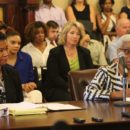Personally opposed to the death penalty and open to the idea of unauthorized immigrants receiving driver’s licenses, Superior Court Judge Kimberly Budd encountered mostly smooth sailing in a vetting interview Wednesday for her nomination to the Supreme Judicial Court.
EARLIER: Governor’s Council To Question High Court Nominee With Springfield Roots
“Personally I don’t see any reason why an illegal immigrant couldn’t have a driver’s license,” Budd told the Governor’s Council on Wednesday, while acknowledging that matter could potentially go before the state’s highest court she seeks to join.
Gov. Charlie Baker, who nominated Budd, last month pushed the Legislature to close a loophole he warned could lead to unauthorized immigrants receiving Massachusetts driver’s licenses, and he supports instituting the death penalty for those who murder police.
“As far as my own beliefs go, I’m not in favor of the death penalty,” Budd said. She said, “Some people may deserve to die, but I don’t think that’s something the government should do.”
LISTEN: Judge Budd introduces herself to the Governor’s Council.
Budd is one of three Baker nominees to the state’s highest court this year. Superior Court Judges David Lowy and Frank Gaziano were both confirmed unanimously. By the end of Budd’s hearing, councilors said it was apparent she would be confirmed.
An opponent of laws that set minimum sentences for those convicted of certain crimes – which restrict judges’ leniency in handing down sentences – Budd was asked by Councilor Joe Ferreira, a former police chief, whether mandatory minimum sentences are constitutional.
“I’m not sure that’s been looked at, but that’s the law right now,” said Budd, who lives in Newton.
The daughter of former U.S. Attorney Wayne Budd, an appointee of President George H.W. Bush, Budd, who grew up in Peabody, also spoke about her perspective growing up as an African American woman in a largely white society.
“I see the world through a different lens. Believe it or not I know what it’s like to be refused service. As a young lawyer I’ve been dismissed offhandedly by more seasoned white, male opposing counsel, and I’ve even been stopped from entering the well of the courtroom because I was mistaken for a defendants’ family member,” Budd said. “If you see fit to confirm me, I would come to the table with a different perspective on the world . . . because I know what it’s like to feel powerless and invisible, as a judge I look criminal defendants and pro se litigants in the eye.”
Witnesses, ranging in age from 17 to 73, attested to Budd’s reputation, character and inspiring example. Budd, who is 49, would be able to serve two decades on the state’s highest court before reaching the mandatory retirement age, a point Councilor Robert Jubinville raised to Supreme Judicial Court Justice Geraldine Hines.
“I came to this job very late in my career, and I envy the energy that she will bring to this job,” said Hines, who said she agrees with the mandatory retirement age of 70, which she will reach next year. Describing her and Budd as “kindred spirits,” Hines said, “She has a gentle spirit – not to be confused with weakness.”
If Budd is confirmed, the state’s highest court would include two black women – Hines and Budd – for a window of time. Hines also testified on behalf of Gaziano.
“I wouldn’t worry about her age. Mr. Jubinville, I know that’s a little thing for you. I’m older than you, and I don’t worry about it,” Suzanne DelVecchio, the former chief justice of the Superior Court said, saying she is 73. Testifying to Budd’s reputation, DelVecchio said, “She’s not rigid. She’s not to the right. She’s not to the left.”
Laila McCain, a 17-year-old Boston Latin School senior who lives in Hyde Park, was one of three former interns to testify on behalf of Budd, who told the News Service she didn’t ask any of them to speak on her behalf.
“After seeing so many injustices it’s kind of hard to have faith in the system,” said McCain, who said she wants to be a lawyer, and said watching Budd preside in a criminal trial taught her the importance of giving respect to both sides.
Councilor Terrence Kennedy said it was the first time he can recall former interns testifying on behalf of a nominee, telling the News Service it “speaks volumes.”
Budd studied English at Georgetown University, graduating magna cum laude in 1988, and Harvard Law School, earning her law degree in 1991 – toward the tail end of her father’s service as top federal prosecutor in the state.
Budd clerked for Massachusetts Appeals Court Chief Justice Joseph Warner, according to her 2009 application for a Superior Court judgeship. From there, Budd worked at Mintz Levin, taught at New England School of Law, and went to work for the U.S. Attorney’s office from January 1995 to September 1998, trying eight cases to verdict, according to her application. After that she worked as university counsel in Harvard University’s general counsel’s office, and in 2004 moved to the director of the Community Values Program, handling ethics and other matters, at Harvard Business School.
Members of Budd’s family, including her husband, Bill Thompson – who works at John Hancock – were in attendance, as well as Tom Reilly, the former attorney general, who is Budd’s godfather.
Under questioning by Jubinville, Budd said she believes too many people are included on the Sex Offender Registry, believes men should stay out of discussion of abortion “for the most part,” and praised a U.S. Supreme Court decision vacating corruption charges against former Virginia Gov. Robert McDonnell.
“You don’t want to criminalize what politicians do every day,” Budd said. At Jubinville’s suggestion, Budd said putting methadone clinics in every courthouse would be a “good option.” Jubinville proposed that if Budd had a magic wand and could switch people’s heroin addictions to the addiction-relieving medications Suboxone and methadone that would be a “no-brainer.”
“Wish I had a magic wand,” Budd replied.
Budd agreed with Councilor Jennie Caissie that the Supreme Judicial Court had erred – and was corrected by the U.S. Supreme Court – in a recent stun gun case. The council’s lone Republican, Caissie did not press Budd over some of her more liberal stances.
Caissie told the News Service she was satisfied with Budd’s answer about what she wanted her legacy to be.
“It wasn’t, ‘I want to be a progressive and change the legal framework.’ It’s that, ‘I want to be known as somebody who knew what they were talking about and advanced the law,'” Caissie said.



